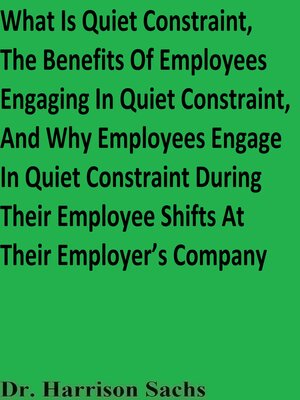What Is Quiet Constraint, the Benefits of Employees Engaging In Quiet Constraint, and Why Employees Engage In Quiet Constraint During Their Employee Shifts At Their Employer's...
audiobook (Unabridged)
By Dr. Harrison Sachs

Sign up to save your library
With an OverDrive account, you can save your favorite libraries for at-a-glance information about availability. Find out more about OverDrive accounts.
Find this title in Libby, the library reading app by OverDrive.



Search for a digital library with this title
Title found at these libraries:
| Library Name | Distance |
|---|---|
| Loading... |
This audiobook is narrated by a digital voice.
This essay sheds light on what is quiet constraint, demystifies the benefits of employees engaging in quiet constraint, and explicates why employees engage in quiet constraint during their employee shifts at their employer's company. Succinctly stated, quiet constraint is the practice of real private sector employees abstaining from disclosing unsolicited, valuable information to their coworkers and managers. Real private sector employees engage in quiet constraint by not volunteering to disclose unsolicited, valuable information to their coworkers and managers. Even though their coworkers and managers may be interested in real private sector employees disclosing unsolicited, valuable information to them, there is no guarantee that relaying unsolicited, valuable information to their coworkers and managers will yield real private sector employees any benefits. Even though highly knowledgeable, highly adept, and highly competent real private sector employees may know how to expeditiously resolve issues that their employer's company is experiencing the brunt of first-hand, they are still nonetheless reticent to disseminate unsolicited, valuable information to their coworkers and managers if they are not explicitly requested to do so. The operational inefficiencies that their employer's company may encounter in its operations are often not perceived as being the problems of real private sector employees. Engaging in quiet constraint by desisting from disclosing unsolicited, valuable information to their coworkers and managers is not only prevalent among real private sector employees who engage in quiet quitting at their employee workplace, but is also prevalent among real private sector employees who have an aversion to metaphorically "go the extra mile" while they are fulfilling their employee position at their employer's company. Real private sector employees are often recalcitrant about striving to exceed the expectations that are set forth by their employer.







